[Editor’s Note: As addressed in last week’s post, entitled The Human Targeting Solution: An AI Story, the incorporation of Artificial Intelligence (AI) as a warfighting capability has the potential to revolutionize combat, accelerating the future fight to machine speeds. That said, the advanced algorithms underpinning these AI combat multipliers remain dependent on the accuracy and currency of their data feeds. In the aforementioned post, the protagonist’s challenge in overriding the AI-prescribed optimal (yet flawed) targeting solution illustrates the inherent tension between human critical thinking and the benefits of AI.
Today’s guest blog post, submitted by MAJ Cynthia Dehne, expands upon this theme, addressing human critical thinking as the often neglected, yet essential skill required to successfully integrate and employ emergent technologies while simultaneously understanding their limitations on future battlefields. Warfare will remain an intrinsically human endeavor, the fusion of deliberate and calculating human intellect with ever more lethal technological advances. ]
The future character of war will be influenced by emerging technologies such as AI, robotics, computing, and synthetic biology. Cutting-edge technologies will become increasingly cheaper and readily available, introducing a wider range of actors on the battlefield. Moreover, nation-state actors are no longer the drivers of cutting-edge technology — militaries are leveraging the private sector who are leading research and development in emergent technologies. Proliferation of these cheap, accessible technologies will allow both peer competitors and non-state actors to wage serious threats in the future operational environment. Due to the abundance of new players on the battlefield combined with emerging technologies, future conflicts will be won 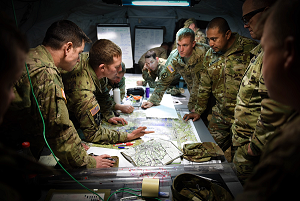 by those who both possess “critical thinking” skills and can integrate technology seamlessly to inform decision-making in war instead of relying on technology to win war. Achieving success in the future eras of accelerated human progress and contested equality will require the U.S. Army to develop Soldiers who are adept at seamlessly employing technology on the battlefield while continuously exercising critical thinking skills.
by those who both possess “critical thinking” skills and can integrate technology seamlessly to inform decision-making in war instead of relying on technology to win war. Achieving success in the future eras of accelerated human progress and contested equality will require the U.S. Army to develop Soldiers who are adept at seamlessly employing technology on the battlefield while continuously exercising critical thinking skills.
The Foundation for Critical Thinking defines critical thinking as “the art of analyzing and evaluating thinking with a view to improve it.” 1 Furthermore, they assert that a well cultivated critical thinker can do the following: raise 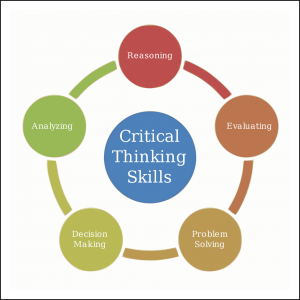 vital questions and problems and formulate them clearly and precisely; gather and assess relevant information, using abstract ideas to interpret it effectively; come to well-reasoned conclusions and solutions, testing them against relevant criteria and standards; think open-mindedly within alternative systems of thought, recognizing and assessing, as needed, their assumptions, implications, and practical consequences; and communicate effectively with others in figuring out solutions to complex problems.2
vital questions and problems and formulate them clearly and precisely; gather and assess relevant information, using abstract ideas to interpret it effectively; come to well-reasoned conclusions and solutions, testing them against relevant criteria and standards; think open-mindedly within alternative systems of thought, recognizing and assessing, as needed, their assumptions, implications, and practical consequences; and communicate effectively with others in figuring out solutions to complex problems.2
Many experts in education and psychology argue that critical thinking skills are declining. In 2017, Dr. Stephen Camarata wrote about the emerging crisis in critical thinking and college students’ struggles to tackle real world problem solving. He emphasized the essential need for critical thinking and asserted that “a young adult whose brain has been “wired’ to be innovative, think critically, and problem solve is at a tremendous competitive advantage in today’s increasingly complex and competitive world.”3 Although most government agencies, policy makers, and businesses deem critical thinking important, STEM fields continue to be prioritized. However, if creative thinking skills are not fused with STEM, then there will continue to be a decline in those equipped with well-rounded critical thinking abilities. In 2017, Mark Cuban opined during an interview with Bloomberg TV that the nature of work is changing and the future skill that will be more in-demand will be “creative thinking.” Specifically, he stated “I personally think there’s going to be a greater demand in 10 years for liberal arts majors than there were for programming majors and maybe even engineering.”4 Additionally, Forbes magazine published an article in 2018 declaring that “creativity is the skill of the future.”5
 Employing future technologies effectively will be key to winning war, but it is only one aspect. During the Vietnam War, the U.S. relied heavily on technology but were defeated by an enemy who leveraged simple guerilla tactics combined with minimal military technology. Emerging technologies will be vital to inform decision-making, but will not negate battlefield friction.
Employing future technologies effectively will be key to winning war, but it is only one aspect. During the Vietnam War, the U.S. relied heavily on technology but were defeated by an enemy who leveraged simple guerilla tactics combined with minimal military technology. Emerging technologies will be vital to inform decision-making, but will not negate battlefield friction. 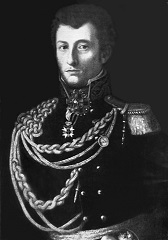 Carl von Clausewitz ascertained that although everything is simple in war, the simplest things become difficult and accumulate and create friction.6 Historically, a lack of information caused friction and uncertainty. However, complexity is a driver of friction in current warfare and will heavily influence future warfare. Complex, high-tech weapon systems will dominate the future battlefield and create added friction. Interdependent systems linking communications and warfighting functions will introduce more friction which will require highly skilled thinkers to navigate.
Carl von Clausewitz ascertained that although everything is simple in war, the simplest things become difficult and accumulate and create friction.6 Historically, a lack of information caused friction and uncertainty. However, complexity is a driver of friction in current warfare and will heavily influence future warfare. Complex, high-tech weapon systems will dominate the future battlefield and create added friction. Interdependent systems linking communications and warfighting functions will introduce more friction which will require highly skilled thinkers to navigate.
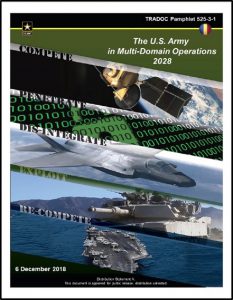 The newly published U.S. Army in Multi-Domain Operations 2028 concept “describes how Army forces fight across all domains, the electromagnetic spectrum (EMS), and the information environment and at echelon“7 to “enable the Joint Force to compete with China and Russia below armed conflict, penetrate and dis-integrate their anti-access and area denial systems and ultimately defeat them in armed conflict and consolidate gains, and then return to competition.”8 Even with technological advances and intelligence improvement, elements of friction will be present in future wars. Both great armies and asymmetric threats have vulnerabilities, due to small things in terms of friction that morph into larger issues capable of crippling a fighting force. Therefore, success in future war is dependent on military commanders that understand these elements and how to overcome friction. Future technologies must be fused with critical thinking to mitigate friction and achieve strategic success. The U.S. Army must simultaneously emphasize integrating critical thinking in doctrine and exercises when training Soldiers on new technologies.
The newly published U.S. Army in Multi-Domain Operations 2028 concept “describes how Army forces fight across all domains, the electromagnetic spectrum (EMS), and the information environment and at echelon“7 to “enable the Joint Force to compete with China and Russia below armed conflict, penetrate and dis-integrate their anti-access and area denial systems and ultimately defeat them in armed conflict and consolidate gains, and then return to competition.”8 Even with technological advances and intelligence improvement, elements of friction will be present in future wars. Both great armies and asymmetric threats have vulnerabilities, due to small things in terms of friction that morph into larger issues capable of crippling a fighting force. Therefore, success in future war is dependent on military commanders that understand these elements and how to overcome friction. Future technologies must be fused with critical thinking to mitigate friction and achieve strategic success. The U.S. Army must simultaneously emphasize integrating critical thinking in doctrine and exercises when training Soldiers on new technologies.
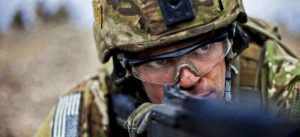 Soldiers should be creative, innovative thinkers; the Army must foster critically thinking as an essential skill. The Insight Assessment emphasizes that “weakness in critical thinking skill results in loss of opportunities, of financial resources, of relationships, and even loss of life. There is probably no other attribute more worthy of measure than critical thinking skills.”9 Gaining and maintaining competitive advantage over adversaries in a complex, fluid future operational environment requires Soldiers to be both skilled in technology and experts in critical thinking.
Soldiers should be creative, innovative thinkers; the Army must foster critically thinking as an essential skill. The Insight Assessment emphasizes that “weakness in critical thinking skill results in loss of opportunities, of financial resources, of relationships, and even loss of life. There is probably no other attribute more worthy of measure than critical thinking skills.”9 Gaining and maintaining competitive advantage over adversaries in a complex, fluid future operational environment requires Soldiers to be both skilled in technology and experts in critical thinking.
If you enjoyed this post, please also see:
– Mr. Chris Taylor’s presentation on Problem Solving in the Wild, from the Mad Scientist Learning in 2050 Conference at Georgetown University, 8-9 August 2018;
and the following Mad Scientist Laboratory blog posts:
– Making the Future More Personal: The Oft-Forgotten Human Driver in Future’s Analysis
MAJ Cynthia Dehne is in the U.S. Army Reserve, assigned to the TRADOC G-2 and has operational experience in Afghanistan, Iraq, Kuwait, and Qatar. She is a graduate of the U.S. Army Command and General Staff College and holds masters degrees in International Relations and in Diplomacy and International Commerce.
1 Paul, Richard, and Elder, Linda. Critical Thinking Concepts and Tools. Dillon Beach, CA: Foundation for Critical Thinking, 2016, p. 2.
2 Paul, R., and Elder, L. Foundation for Critical Thinking. Dillon Beach, CA: Foundation for Critical Thinking, 2016, p. 2.
3 Camarata, Stephen. “The Emerging Crisis in Critical Thinking.” Psychology Today, March 21, 2017. Accessed October 10, 2018, from https://www.psychologytoday.com/us/blog/the-intuitive-parent/201703/the-emerging-crisis-in-critical-thinking.
4 Wile, Rob. “Mark Cuban Says This Will Be the No.1 Job Skill in 10 Years.” Time, February 20, 2017. Accessed October 11, 2018. http://time.com/money/4676298/mark-cuban-best-job-skill/.
5 Powers, Anna. “Creativity Is The Skill Of The Future.” Forbes, April 30, 2018. Accessed October 14, 2018. https://www.forbes.com/sites/annapowers/2018/04/30/creativity-is-the-skill-of-the-future/#3dd533f04fd4.
6 Clausewitz, Carl von, Michael Howard, Peter Paret, and Bernard Brodie. On War. Princeton, N.J.: Princeton University Press, 1984, p. 119.
7 U.S. Army. The U.S. Army in Multi-Domain Operations 2028, Department of the Army. TRADOC Pamphlet 525-3-1, December 6, 2018, p. 5.
8 U.S. Army. The U.S. Army in Multi-Domain Operations 2028, Department of the Army. TRADOC Pamphlet 525-3-1, December 6, 2018, p. 15.
9 Insight Assessment. “Risks Associated with Weak Critical Thinkers.” Insight Assessment, 2018. Accessed October 22, 2018, from https://www.insightassessment.com/Uses/Risks-Associated-with-Weak-Critical-Thinkers.



